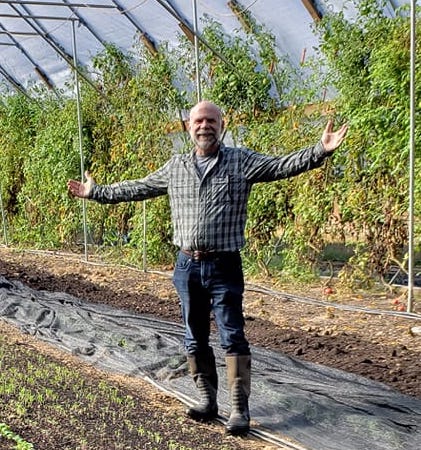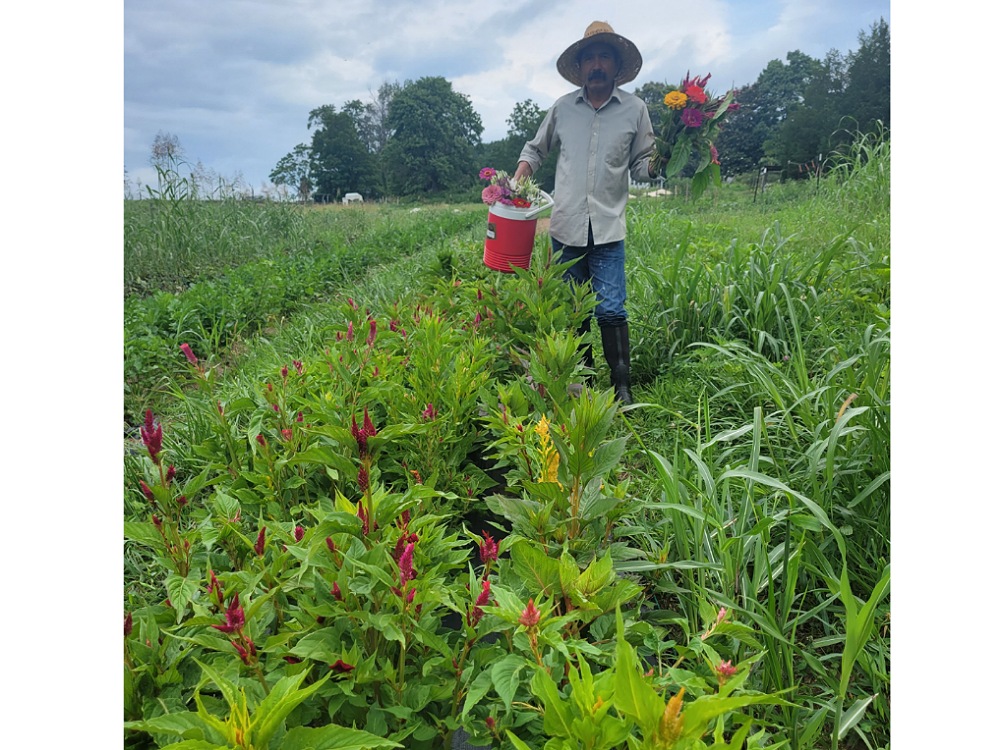



The Team
The online store is open from Thursday 8PM to Monday. You don’t need an account to buy our products, but if you can’t complete your purchase, it means the store is closed. Delivery/Pickup Options




The Team
Horticulturalist/ Farm manager



Jesse has a background in Dutch horticulture and business management and fell in love with farm life working on a fruit and nut tree nursery in the Netherlands. Farming at BFF is his passion and he loves the connection between health and the care of the soil! Jesse does web design work in the winter!
Farmer/Project Manager

Tom grew up around farm life, is a hard worker and loves a good challenge. He spearheads our construction projects and loves mushroom hunting.
Marketing/Logistics

Shari, originally a northerner from Pittsburgh, is a big reason Jesse found farming thanks to her drive to eat real food! Shari loves to help at the farm. She also runs the Midlothian pick-up point for the CSA and online orders.
Organically or ecologically grown means that we value clean food! While we could increase our production using methods that produce more abundance, we value our health and avoid using substances or materials that are deemed unhealthy or questionable.
No! We started the process to become certified through CCOF and were at the stage to receive our annual inspection only to find out the hidden costs associated with certification. In hindsight, for any beginning farmers out there make sure you apply to a certification program close to you. Maybe we will look back into it at some point but we are happy to answer this question and engage with our customers over checking the box.
One of the things that we easily could do, but think the disadvantages to the planet outweigh the advantages to profit is the use of Single-Use Plastic!
Single-use Plastic offers upwards of 50% increases in growing without plastic mulch. Growing a plant in a plastic mulch reduces the loss of fertilizers, reduces the need for weeding, holds more water in the soil, and simply adds more water weight to produce. (Erik Kobayashi-Solomon, 2019)
Unfortunately, without single-use plastic, we would probably have a vegetable shortage in little time. Operating a vegetable farm there is a fine line between making a profitable production and losing money from lost inputs or excessive labor. Single-use plastic makes it much easier to be profitable but at a major environmental cost.
In 2019, one estimate claimed there to be at least 55,000 tons at an agricultural dumpsite in Florida. We grew one crop of sweet potatoes many years ago testing out single-use plastic and filled up a whole utility trailer only from 400 bed-foot rows.
Aside from the ridiculous amount of waste produced there has been a lot of research showing that plastic particles are also being found in plant roots, crops, and even human blood. These plastics may be altering the soil-microbe relationship in the soil as well. (Klob, 2022)
There are biodegradable options out there but these are costly and often created with GMO corn and cause more harm when broken down in the soil. Our solution is to avoid plastic in the fields and only use durable plastics that we can use for the next 10 years if taken care of. That means we can’t put them down easily with a tractor, but we feel like we are trying to be part of the solution.
Other efforts we incorporate are the succession of cover crops following cash crops to keep the soil covered and encourage the cycling of nutrients to feed the soil for the next cash crop.
At the end of the day, we export a lot of food off of our farm! And we don’t get any of these nutrients back. To make up for this we grow a lot of cover crops but also buy in organic certified dry amendments.
Before we became globalized with trade and are now able to truck in wastes from one place to feed our soil, we used to grow on alluvial soils closer to rivers that were prone to flooding. The floods would recharge the soils with minerals. Now there are few places left on Earth that we can simply sustain off of what is already there.
We are in a unique position to observe what is sustainable having the opportunity to also raise grass-fed lamb and cattle on our farm. Raising animals for meat production is much less manipulative to the landscape and follows a regenerative cycle of grazing and making hay!
At BFF we also raise beef and lamb for proteins for now separately from vegetable production. As we grow we hope to incorporate the two and reduce our need to buy in organic amendments. For now, we can make a decent amount of compost from their winter bedding and manures.
While it may still be debated as to if grass-fed is better for you than grain-finished beef or lamb, we think it’s the most natural way to raise animals.
As nature intended, our animals graze grasses and legumes during the growing season and we cut hay (rolled up, dry grasses) to feed in the winter. Our animals get plenty of exercises and are healthy animals. I did not eat much meat before I started farming, just thinking about the welfare of the animals offered in the stores. Now, I try to incorporate a decent amount of meat in my diet because they taste delicious and I know these animals lived happily and healthily in our fields.
BFF is a first-generation farm started in 2017. Jesse Roberts, (that’s me) is the resident horticulturist and farm manager. My parents started down the rabbit hole of what is wrong with our food when my mom was battling colon cancer. She is now in remission and if you happen to pick up your produce from Midlothian you will most likely soon be great friends with Shari!












After leaving home, Jesse first studied biology in Virginia. As a student-athlete, trying to eat organic became a challenge due to the added expense and Jesse started to research the differences between conventional and organic farming. This became a 4-year study into understanding the balance of chemistry, biology, and physical science involved in producing healthy crops. For three of those years, he studied horticulture and business management in the Netherlands.


At BFF we use no synthetic pesticides or fertilizers, we use no GMOs, we plant habitats for pollinators, use small doses of “organic” bio-pesticides, we use lots of compost to replenish burnt carbon lost in uncovering the soil, plant cover crops and make compost teas with cultured micros to nourish the soil. We keep honeybees for pollination and they enjoy the diversity of crops that we grow and flourish in early spring with all the maple trees blooming. Our practice is to perform in-depth soil samples to know how to make custom mineral-balancing amendments per crop to grow the most nutritious veggies that we can.
Jesse hopes that many generations after him will be able to work on the same plot of land that he began with his parents. This hope for the future directly ties into the sequestration techniques that he is employing through regenerative farming.
BFF looks forward to growing their flerd and may start working towards a silvopasture system through the forest.
Hopefully this spring, BFF is working on wild-simulated mushrooms in the forest. We are also in the process of adding interesting fruits to the farm. Stay tuned.
Kobayashi-Solomon, E. (2019) Feeding the world with plastic, Forbes. Forbes Magazine. Available at: https://www.forbes.com/sites/erikkobayashisolomon/2019/05/24/feeding-the-world-with-plastic/?sh=7481b1075ada (Accessed: January 25, 2023).
Kolb , N. (2022) The overlooked root of plastic culture in the food system, Sierra Club. Available at: https://www.sierraclub.org/sierra/overlooked-root-plastic-culture-food-system (Accessed: January 25, 2023).
Sign up to get the latest news, crop lists, deals and store changes!